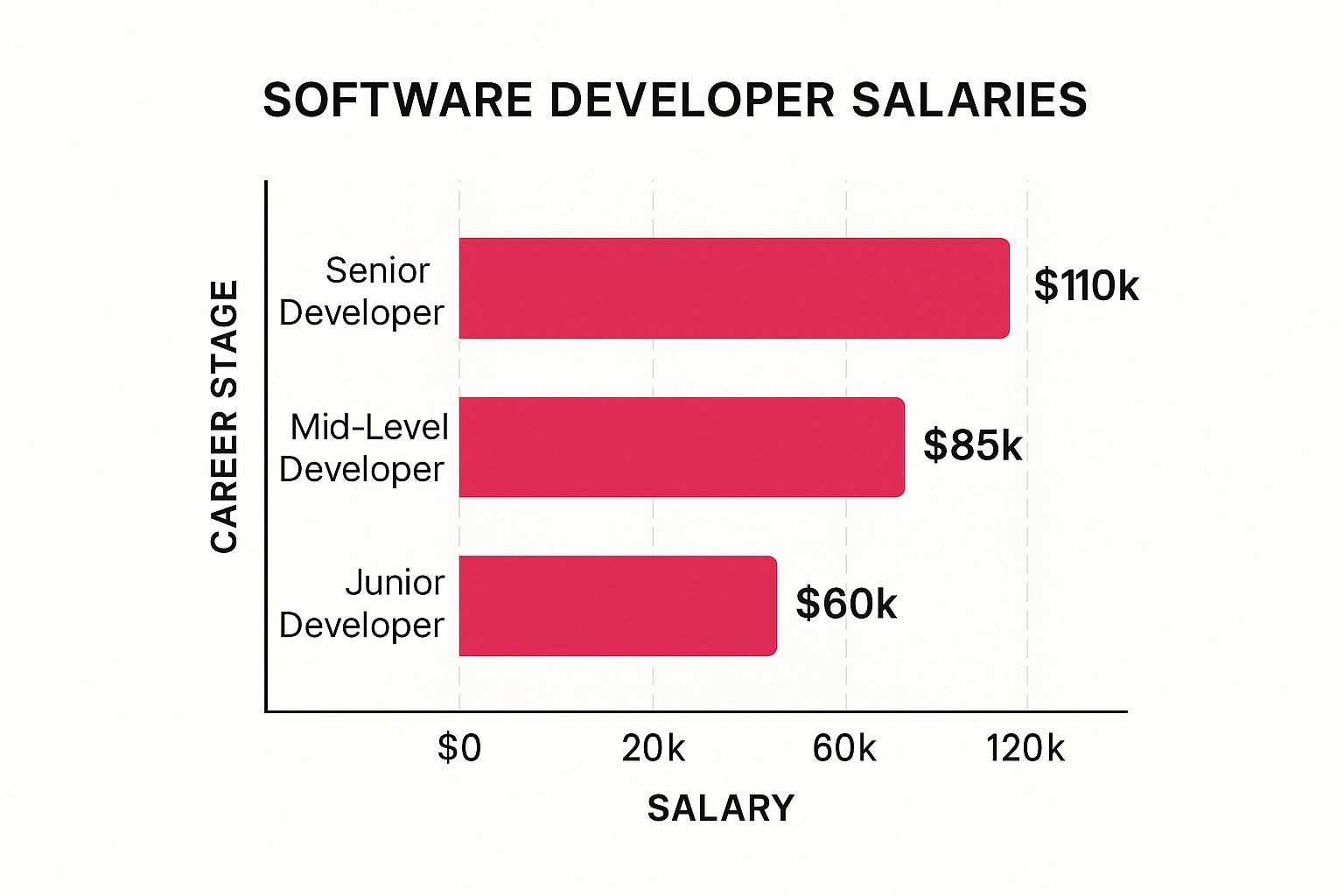The Evolving Landscape of Software Development Careers
The software development world is constantly changing, creating new career paths and specializations. Understanding these shifts is key to a successful career as a software developer.
Global Growth and Emerging Markets
The increasing need for software solutions worldwide is driving growth in the developer population. Emerging markets are playing a key role in this expansion. For example, India’s developer numbers have significantly increased, impacting the global distribution of tech talent. This creates both challenges and opportunities for developers. Current estimates put the global developer population at 26.9 million, projected to reach 28.7 million by 2024. Countries like China, with approximately 7 million developers, contribute significantly to this growth, reflecting the rising demand for software across various sectors. For more detailed information, check out these developer statistics.
To further illustrate this growth, let’s look at the distribution of developers across key regions. The following table provides a regional breakdown of developer populations, growth rates, and key specializations.
Salary Expectations and Career Progression
Understanding salary expectations at each career stage is crucial. The infographic below illustrates the average salary progression for software developers.

As experience increases, so does compensation. Junior Developers can expect around $60k, Mid-Level Developers around $85k, and Senior Developers can earn approximately $110k. This data clearly shows the financial benefits of continuous learning and development in this field.
The Impact of Technological Advancements
New technologies are changing how software is developed and the types of software needed. This creates a constant demand for new specializations. Areas like Artificial Intelligence (AI), Machine Learning (ML), and blockchain are leading to new roles within the industry. Adaptability and lifelong learning are crucial for staying competitive. The rise of remote work, supported by platforms like Remote First Jobs, adds another layer to this evolving landscape, giving developers more flexibility.
Positioning Yourself for Success
Technical skills are essential, but soft skills like communication, collaboration, and problem-solving are also increasingly important. Building a strong professional network opens doors to new opportunities and mentorship. This proactive approach to career management is vital for thriving in this dynamic industry. Developers who actively seek growth opportunities and networking will be best prepared for the changing software development world.
Breaking Into Development: Launching Your Coding Career

Starting a software developer career can feel overwhelming. But with a structured approach, the process becomes much more manageable. This section outlines practical strategies for entering the field, emphasizing the importance of both technical skills and a compelling portfolio.
Effective Entry Points: Bootcamps and Internships
Several pathways lead to a career in software development. Bootcamps offer intensive, targeted training designed to get you job-ready quickly. Internships, alternatively, provide practical, real-world experience and valuable networking opportunities.
For newcomers, understanding how you learn best is helpful. This article explores the best way to learn to code. The ideal entry point depends on individual learning styles, financial circumstances, and career aspirations. Both bootcamps and internships can greatly improve your prospects of landing that first developer role.
Essential Technical Skills for Success
Technical proficiency is crucial in software development. Mastering core programming languages like Python, JavaScript, and Java is key. Understanding databases and Git for version control is also essential. These are the skills hiring managers consistently seek. Your technical abilities are often the first hurdle in the application process.
Building a Standout Portfolio: Showcasing Your Skills
You can build an impressive portfolio even without professional experience. Contributing to open-source projects, developing personal projects, and participating in hackathons are all great ways to showcase your abilities. A solid portfolio demonstrates practical skills and a passion for coding. It provides potential employers with insights into your coding style and problem-solving approach.
Mastering the Technical Interview: Psychology and Preparation
Technical interviews can be stressful. However, understanding the psychology behind them can ease anxiety. Interviewers look for technical competence and a growth mindset. Explaining your thought processes and problem-solving approach is just as important as finding the right solution. For valuable tips and strategies, check out our guide on How to master coding interviews. Thorough preparation is crucial for showcasing your skills and managing nerves.
Real-World Strategies from Recent Hires
Learning from others who recently landed a software developer role can be incredibly helpful. Recent hires often stress the value of networking and tailoring your resume and cover letter to each specific role. They also highlight showing genuine enthusiasm for the company and its mission. Some successful candidates have even found unconventional ways to stand out, such as creating personal websites or contributing to relevant online communities. These strategies can be the deciding factor in securing a job offer.
The Mid-Level Developer Transition: Beyond Code Execution
Making the leap from junior to mid-level software developer is a big step in a software developer career path. It’s more than just writing code. It signifies a shift in how you think, the skills you possess, and your whole approach to development. Let’s explore how to successfully navigate this critical stage.
Balancing Technical Depth and Breadth
Mid-level developers often juggle deep technical expertise in certain areas with a broader understanding of other technologies. Specializing is valuable, but having a wider knowledge base allows for greater flexibility and stronger problem-solving skills. This adaptability is essential in a fast-moving industry where new technologies constantly appear. Think of it like building a house: you need specialized skills like plumbing and electrical work, but also a general understanding of construction principles to ensure everything works together.
The Importance of Non-Technical Skills
Technical proficiency is essential, but non-technical skills, often called soft skills, become increasingly important at the mid-level. Effective communication, collaboration, and problem-solving are key. For instance, explaining technical concepts clearly to non-technical team members is vital for project success. These soft skills empower mid-level developers to contribute more effectively to teams and take on greater responsibility. For those considering a tech-adjacent field, this article about Transitioning into a Customer Success role offers an interesting alternative career path.
Overcoming Imposter Syndrome and Embracing Challenges
Many developers experience imposter syndrome, particularly during career transitions. Recognizing this and concentrating on continuous learning and skill development is crucial. Embrace challenges as opportunities for growth, which builds both confidence and expertise. Remember, every seasoned developer has encountered similar hurdles throughout their software developer career path. Check out these Remote mid-level jobs currently available.
Understanding Expectations for Promotion
Understanding what engineering managers look for in potential mid-level developers is vital for career advancement. Technical skills are expected, but it’s often the less tangible qualities that make a real difference. These include:
Proactive Problem-Solving: Identifying and resolving issues before they become major problems.
Ownership and Accountability: Taking responsibility for your work and its overall impact.
Mentorship and Guidance: Supporting junior developers by sharing your knowledge and experience.
Effective Communication: Clearly conveying technical information to both technical and non-technical audiences.
Building a Roadmap for Advancement
Transitioning to a mid-level developer role requires a planned approach. This includes:
Identifying Your Strengths and Weaknesses: Focus on building skills that align with your career aspirations.
Seeking Feedback and Mentorship: Regularly ask for feedback to identify areas for improvement.
Networking and Building Relationships: Connect with other developers and learn from their experiences.
Staying Updated with Industry Trends: Continuous learning is vital for remaining competitive in this rapidly evolving field.
By focusing on these key areas, developers can successfully make the transition to mid-level, setting the stage for ongoing growth and success in their software developer career path.
Senior Developer Pathways: Technical Leadership and Beyond

Reaching senior status as a software developer isn’t the final destination; it’s the start of a new adventure with many possibilities. This critical stage in a software developer’s career requires careful thought about the direction you want to take. This section will guide you through the various choices available, from refining your technical expertise to leading and mentoring teams.
Exploring The Diverse Paths For Senior Developers
Senior developers have a range of options, each tailored to individual interests and skills. Some might be drawn to technical leadership positions, such as a Technical Architect, where they design and manage complex systems. Others might prefer team leadership, guiding and mentoring a group of developers. Still others excel as specialized individual contributors, delving deep into specific technical niches. Each path offers its own set of rewards and difficulties.
Day-In-The-Life: Understanding The Realities Of Each Role
Understanding the daily routines associated with each senior developer role is vital for making informed career choices. A Technical Architect might spend their time designing system architectures, working with stakeholders, and exploring emerging technologies. A team leader might facilitate team discussions, mentor junior developers, and manage project schedules. An individual contributor, on the other hand, might focus intensely on writing code, conducting research, and advancing their area of expertise.
Balancing Deep Technical Skills With Mentorship
One key characteristic of senior developers is their ability to balance profound technical knowledge with mentorship responsibilities. This involves contributing at a high technical level while also guiding and supporting less experienced colleagues. This balance is crucial for team growth and knowledge sharing within any organization. For instance, a senior developer might review code, offer constructive feedback, and share best practices, all while tackling challenging technical projects.
Essential Skills For Success At The Senior Level
Success as a senior developer isn’t solely determined by technical proficiency. Organizational influence, the ability to shape decisions and direction without formal authority, becomes increasingly significant. This involves cultivating relationships, communicating ideas effectively, and understanding the nuances of organizational dynamics. Strategic thinking and the ability to connect individual work with overarching organizational goals are also highly valued.
Let’s talk about compensation. To understand the salary landscape for senior developers, it’s helpful to see a comparison across different specializations and company types. The table below provides a general overview.
To illustrate the financial aspect, let’s consider senior full-stack developers. In 2025, a senior full-stack developer working on mid-sized projects could earn between $16,800 and $76,000 per month. On larger projects, this could significantly exceed $76,000 monthly. These figures reflect the median annual wage of $133,080 for software developers as of May 2024. You can find more detailed statistics here. Those interested in remote work can explore options for remote senior-level jobs.
Evaluating Your Strengths And Interests
Choosing the right path as a senior developer requires honest self-reflection. Consider your strengths, passions, and long-term career aspirations. Do you find fulfillment in leading and mentoring others? Does architecting complex systems excite you? Or do you prefer the deep focus that comes with individual contribution? Reflecting on these questions will help you identify the path best suited to your goals.
Navigating Your Senior Developer Journey
The senior developer phase of a software development career is both exciting and demanding. It’s filled with opportunities to specialize, lead, and have a meaningful impact within an organization. By carefully weighing the various paths available and honestly assessing your strengths, you can navigate your senior developer journey with purpose and intention.
Beyond Code: Alternative Paths for Technical Minds
A background in software development equips you with a valuable skillset applicable to a diverse range of career paths outside of traditional coding. This section explores how developers can apply their technical expertise in related fields like product management, developer relations, technical writing, and technology consulting. These alternative roles offer unique opportunities to use your skills in new and engaging ways.
Product Management: Bridging the Gap Between Tech and Business
Product managers are essentially the architects of a product’s vision and roadmap. They blend technical understanding with market analysis and business acumen to guide product development from its initial conception to its eventual launch. A software development background provides a solid foundation for this role. You understand the intricacies of building software, allowing you to effectively communicate with engineers and make informed decisions about product features and timelines.
Developer Relations: Building Bridges Within the Tech Community
Developer relations, often called DevRel, focuses on nurturing relationships between a company and its developer community. This role involves creating content, organizing events, and acting as a liaison between developers and the product team. Your development experience allows you to understand the needs and challenges of other developers, enabling you to build strong relationships and offer effective support. This role relies heavily on communication and community-building skills.
Technical Writing: Making Complex Information Accessible
Technical writers translate complex technical information into clear, concise documentation. They create user manuals, tutorials, and other resources that help users understand and interact with software. A background in development gives you a distinct advantage in this field. You possess an in-depth understanding of the technology, making it easier to explain complicated concepts to a broader audience. This path also offers the chance to hone your writing and communication skills. As the need for clear and accessible technical documentation increases, so too do the opportunities for technical writers. Many technical writers find themselves moving into related areas such as content strategy, training, or user experience (UX) design.
Technology Consulting: Solving Business Challenges With Technical Expertise
Technology consultants advise businesses on how to best utilize technology to meet their objectives. They analyze business needs, recommend solutions, and oversee implementation. A development background provides you with valuable insights into the technical aspects of these solutions. This position also emphasizes problem-solving and analytical skills. The ability to understand both business and technical perspectives is key to success in this field. You would act as a bridge between technical teams and business stakeholders, ensuring that technology investments align with overarching business goals.
These alternative career paths provide developers with exciting opportunities to use their technical skills in new and different ways. By carefully exploring each option, you can discover a fulfilling career that aligns with your unique strengths and aspirations.
Sustainable Learning: Staying Relevant Without Burnout

The software development world is in constant motion. For a lasting career, continuous learning is essential. This section explores how developers maintain their skills without burning out, offering practical strategies for identifying valuable technologies and building sustainable learning habits.
Evaluating Emerging Technologies: Separating Hype From Substance
Staying relevant means recognizing truly impactful technologies versus short-lived trends. One effective strategy is focusing on technologies solving real-world problems with significant industry support. For instance, cloud computing fundamentally changed software deployment and management. Analyzing industry reports and attending reputable conferences like those hosted by O’Reilly Media can offer valuable, long-term insights. This targeted approach helps you invest your time wisely.
Sustainable Learning Habits: Integrating Learning Into Your Routine
Busy schedules require intentional learning. Many developers dedicate specific weekly time slots for focused study. This could involve online tutorials, coding challenges on platforms like LeetCode, or contributing to open-source projects on GitHub.
Online Tutorials
Coding Challenges
Open-Source Projects
Consistency, even in small doses, is key. Think of it like fitness: regular short workouts are more effective than sporadic intense ones.
Balancing Depth vs. Breadth: Maximizing Your Knowledge Portfolio
Balancing specialization with broad knowledge is crucial. Early in your career, exploring various technologies and languages is beneficial. This “breadth-first” approach helps discover passions and identify areas for later specialization. As you progress, deep expertise in specific domains becomes increasingly valuable, making you a sought-after expert.
Leveraging Existing Expertise: Learning Through Connections
Connecting new technologies to existing knowledge makes learning easier. For example, a skilled JavaScript developer learning a new front-end framework can leverage existing JavaScript knowledge. This “connecting-the-dots” approach builds new skills on a solid foundation.
Wisdom From Veteran Developers: Maintaining Enthusiasm
A long career requires more than just chasing trends. Veteran developers emphasize intrinsic motivation. This could be contributing to meaningful projects, engaging with communities, or mentoring. Staying engaged and reigniting enthusiasm is key to navigating a software development career. These strategies, coupled with smart learning habits, help developers stay relevant, avoid burnout, and build fulfilling careers.
Crafting Your Personalized Software Developer Career Map
A successful software developer career isn’t a linear progression; it’s a journey shaped by your own ambitions, skills, and the constantly shifting tech world. This section offers frameworks for evaluating where you stand now, setting your sights on where you want to be, and creating a roadmap to bridge the gap.
Assessing Your Current Position: Taking Stock of Your Skills
Before mapping out your future, it’s essential to understand your present. Take time to pinpoint your technical strengths and areas where you could improve. Think about the programming languages, tools, and frameworks you’re proficient in. Equally important are your soft skills: communication, collaboration, problem-solving, and time management. This self-assessment will serve as the bedrock for your development plan.
Defining Your Long-Term Aspirations: Envisioning Your Ideal Career
Where do you picture yourself in 5, 10, or 20 years? Do you see yourself leading a team, designing complex systems, becoming an expert in a niche technology, or perhaps transitioning into a related field like product management or technical writing? Clearly defining your long-term aspirations provides a destination for your career journey.
Mapping the Strategic Steps: Bridging the Gap
Once you understand your starting point and your desired destination, it’s time to build a roadmap. Break down your long-term goals into smaller, more manageable milestones. For instance, if you want to become a team leader, you could set milestones like mentoring junior developers, taking on project leadership roles, and honing your communication skills. These milestones act as checkpoints along the way, ensuring you’re progressing towards your ultimate goals.
Communicating Your Aspirations: Seeking Support and Guidance
Talking about your career goals with managers, mentors, and potential employers is crucial for success. Clearly express your aspirations and the steps you’re taking to achieve them. This transparency allows others to support your journey by offering guidance, opportunities, and valuable feedback. This communication can be anything from a casual chat with your manager to a formal presentation of your career development plan.
Tools and Techniques for Career Planning: Staying Organized and Focused
Several resources can help you stay organized and motivated throughout this process. Consider creating a career planning document that outlines your goals, milestones, and action steps. Reflection exercises, such as journaling or using self-assessment questionnaires, can help you clarify your priorities and identify potential roadblocks. Keeping this documentation helps you stay focused, track your progress, and make necessary adjustments along the way.
Periodic Reassessment: Adapting to the Evolving Landscape
The tech industry is in constant flux, so regular reassessment is crucial. Review your career map at least once a year, or more often if there are significant industry shifts. Be prepared to adjust your goals, milestones, and strategies as needed to ensure your plan remains relevant and effective. This adaptability is key to successfully navigating the dynamic world of software development.
Are you ready to take your remote software development career to the next level? Explore thousands of remote opportunities on Remote First Jobs and find the perfect role to match your aspirations. Start your search today!
